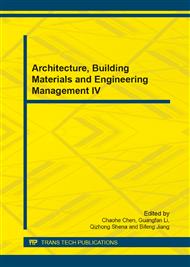p.1603
p.1607
p.1611
p.1618
p.1622
p.1626
p.1630
p.1635
p.1641
Effects of a Hybrid Superplasticizer on the Enhancement of Chloride Resistance in Offshore Concrete
Abstract:
The superplasticizer is very useful to reduce mixing water in fresh concrete, which results in the enhancement of watertightness and strength of hardened concrete. But it has a limit of not preventing steel bar embedded in concrete from corrosion under critical corrosive environments. Thus, this study aims at developing a nanohybrid agent chemically combining PCA admixture with anionic charge of clay. As results of concrete tests using general PCA superplasticizer and new one developed, it can be found that new plasticizer has higher performance in terms of time-dependent slump and air content loss, compressive strength, and anti-corrosion. It is expected for new superplasticizer, called the PCA-HT NHA, to be applicable to concrete under severe corrosive environments.
Info:
Periodical:
Pages:
1622-1625
Citation:
Online since:
July 2014
Authors:
Price:
Сopyright:
© 2014 Trans Tech Publications Ltd. All Rights Reserved
Share:
Citation:


